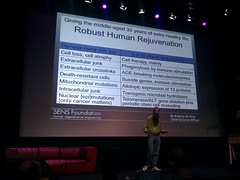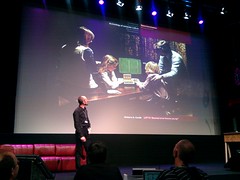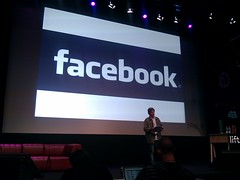LIFT 2010: Generations
 Aubrey de Grey: Prospects for regenerative medecine against aging
Aubrey de Grey: Prospects for regenerative medecine against aging
Aubrey doesn't work on immortality, he works on aging, for a US nonprofit called SENS Foundation, interested in combatting aging using regenerative medicine.
Death from aging isn't just "natural causes": it's anything that mainly kills old people. Don't think about longevity, think about keeping people healthy. When we're good at this, people will live longer - but that's a side-effect, it's not the main purpose. 2/3 of the 150k people who die every day die of aging (90% in the industrialised world).
And aging isn't fun, even if you don't get nasty diseases.
Being old and frail is extremely expensive: $200bn p.a. in the USA alone. The last year of life, if you're over 60, costs more than the rest of your life. So it makes economic sense too.
Why is aging defended? Rational denial: it's both ghastly and inevitable. And it's rational to put ghastly inevitable things out of our minds. But what if it wasn't so clearly inevitable? Aubrey thinks we'll have a big effect on it within our lifetimes.
What is aging? The accumulation of damage, the side-effects of normal metabolic processes. Our existing treatments against aging are "the geriatrics approach": trying to do something about the pathology of old age. This is a losing battle. The other approach (gerontology) is that prevention is better than cure: clean up metabolism by slowing down the accumulation of damage.
But metabolism is incredibly complicated: we only understand a tiny amount of it. If we try and interfere, we'll fail.
In the "maintenance approach", we don't try to slow down the creation of damage, or its consequences: we repair it periodically. Damage isn't complicated, compared to metabolism. Damage is junk, cells, mutations and protein crosslinks. No new types of damage have been confirmed since 1982, we can be confident this is a complete list.
This would lead to an extra 30 years of human life. These are all maintenance therapies, applied to people who are already middle-age: making 60/70 year olds biologically younger.
Longevity Escape Velocity: the rate at which rejuvenation therapies must improve to outpace the accumulation of so-far irreparable damage. By the standards of most technologies, we're going fast. So anyone getting first-generation treatment should live for as long as the therapies keep developing.
He has a book; is interested in donations of money, or research time.
 Doomed to be forever young, Antonio A Casilli
Doomed to be forever young, Antonio A Casilli
Shows his cousin and grandmother using MySpace and Youtube respectively. What does "digital native" mean?
There is no empirical evidence for digital natives. Not all children are computer-savvy (there's strong variability in language/linguistic skills/etc/). The situation is changing quickly and sharply.
The myth of "wired kids" was created in 1982, and has flourished ever since. Let's look at artifacts (computers) and how they've been at the centre of two social dynamics: reterritorialisation (computers have changed the place where they sit: military bases to factories to offices to households) and miniturisation.
The commercial names of computers performed a "dismissal of adulthood": the Piccolo, the Husky, the IBM PC Jr, Microbee, Apricot, Apple. The worst performers in the market: Vixen, Power 10 Cortex, Dragon, Charlemagne.
Why this dismissal of adulthood? Economic reasons: younger generations buy high added-value services, so are targeted by more aggressive marketing campaigns. Cultural reasons: technology associated with a futuristic optimism (post-Big Brother), leading to a change in our perception of age cohorts and generations. Political reasons: the divide between digital natives and immigrants mirrors a real-life divide between old and young that we see in real life.
Actually, digital natives never existed. Economic, cultural and political factors account for the creation of this myth. With 2bn people online, perception evolves.
 How is my generation being transformed by technology: Julian Zbar
How is my generation being transformed by technology: Julian Zbar
Anyone my age is an expert on the Internet. We are no different to any other generation; some preconceptions about us are true, some false. We've not known a world without the Internet, it's a given for us. One physiological change: the Internet is our extra limb. We're as cost-conscious as you, but expect everything to be free.
Connectivity is no longer a luxury, it's a necessity: whatever you're doing, you need to be connected to the Internet. It's not as important what you're connected with.
Everything beyond hardware should be free. What we do on the Internet has no monetary cost, there's no opportunity cost for us to be online. We don't consume out of necessity, but there's lots of music I wouldn't own if its ownership had meant giving up something else.
We're accustomed to receiving an awful amount and giving back nothing at all. The internet is feeding us all the free lunches we can stomach. You wouldn't download a car? If I could, I would.
Short attention spans. Interchangeable sources. Instant information. When it becomes so easy to get something, you have less interest in it. Articles would be more interesting if I had to wander somewhere to fetch them.
We discard the things we don't like, rather than choosing the things we do like: choosing things takes too much time.
The Internet follows us everywhere. We are never doing nothing. Don't confuse this with exponential growth in productivity, it's just very easy to fill every waking moment with activity.
On social media: 2 years ago a few people were resisted, today everyone has a Facebook account. Being social is no longer an active decision: your social scene falls onto your lap without your wanting or seeking it. Facebook is a paparazzi magazine of everyone you have ever met. The beauty of meeting people and forming relationships has been lost. When you meet someone, you already have a great deal of information about them: it changes the way you act even when you're not using it.
Everything is classified and exposed: like, ignore, add, etc. Social actions are trivialised: judging, rejecting, commenting is all less important. You don't get the human reaction to your own actions in front of you.
It's easier to use Facebook and Skype to say difficult things; it's as though we're forgetting the spontaneity of conversation. Like road rage, two drivers sitting in their cars and cursing each other for a trivial motoring incident.
No-one is consciously worrying about privacy. Google stalks your searches, Facebook knows your social info. How can you worry about your privacy?
Every situation is documented and exposed. Little judgement is given to what is put up. This distorts our scale of value: everything is consistently and repeatedly replaced by something new.
Twitter doesn't add any value over and above a Facebook account. It hasn't caught on for my generation in Switzerland.